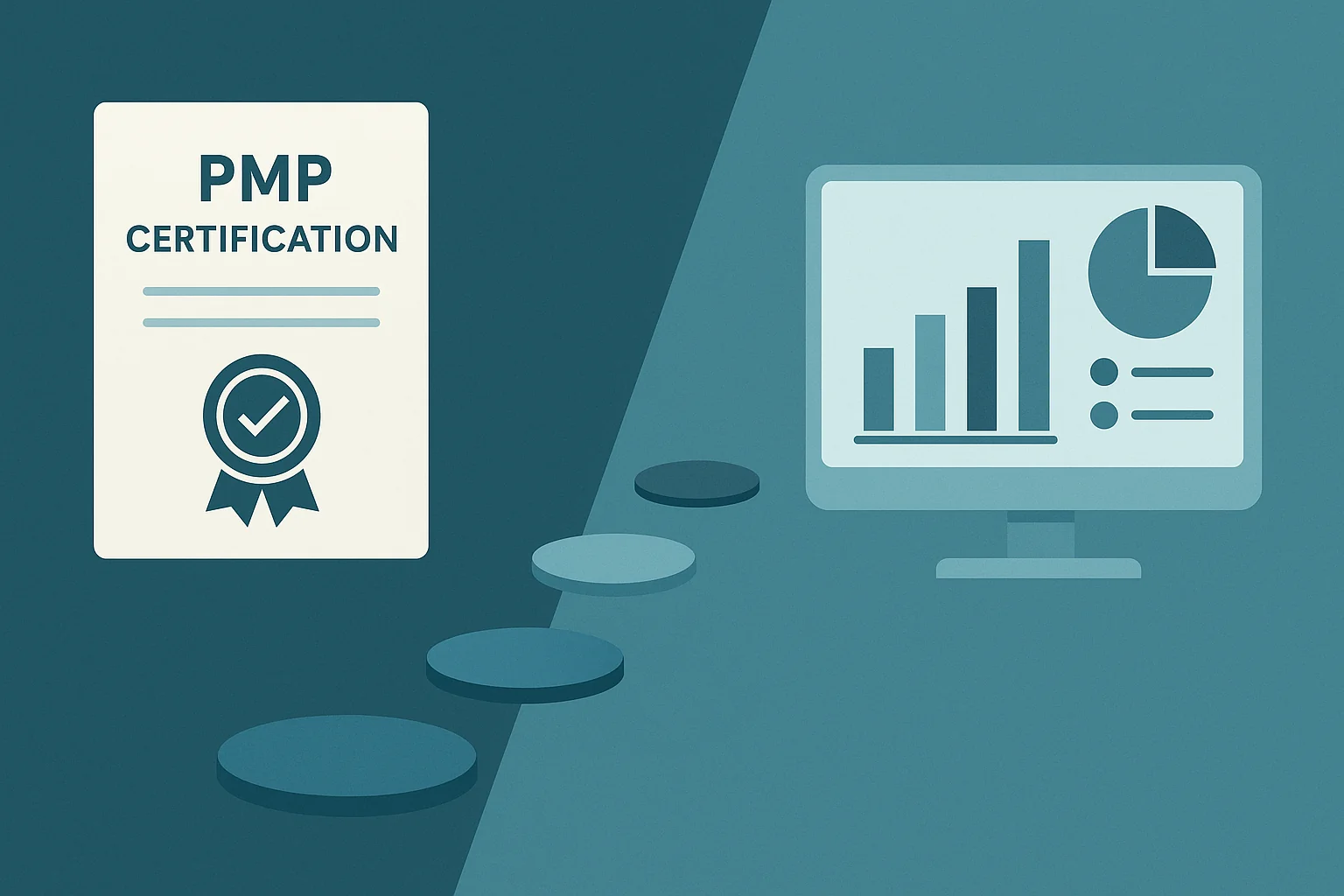Introduction to PMP Certification
The Project Management Professional (PMP) certification is a globally recognized credential offered by the Project Management Institute (PMI). It signifies that an individual possesses the knowledge, skills, and experience necessary to lead and direct projects effectively. The certification is designed for project managers who are looking to validate their expertise and enhance their career prospects in the field of project management.
Definition and Overview of PMP Certification
- What is PMP Certification?
PMP certification is a professional designation that demonstrates a project manager’s ability to manage projects and lead teams. It covers a wide range of project management principles, methodologies, and best practices, ensuring that certified professionals are equipped to handle complex projects across various industries. - Eligibility Requirements:
To obtain PMP certification, candidates must meet specific educational and professional experience criteria. Typically, this includes having a secondary degree (high school diploma, associate’s degree, or global equivalent) along with 7,500 hours of leading and directing projects, or a four-year degree with 4,500 hours of leading and directing projects, plus 35 hours of project management education.
Importance of PMP in the Project Management Field
- Industry Recognition: PMP certification is highly regarded in the project management community and is often considered a prerequisite for higher-level positions. It demonstrates a commitment to the profession and a mastery of project management concepts, making certified professionals more attractive to employers.
- Enhanced Career Opportunities: Holding a PMP certification can significantly enhance career prospects. Many organizations prioritize hiring certified project managers for leadership roles, as they are seen as more capable of delivering successful project outcomes. This certification can open doors to advanced positions, including program manager and portfolio manager roles.
- Increased Earning Potential: Statistics show that PMP certification holders tend to earn higher salaries compared to their non-certified peers. According to PMI’s Earning Power: Project Management Salary Survey, PMP-certified professionals earn, on average, 20% more than those without the certification. This financial incentive is a compelling reason for project managers to pursue PMP certification.
Brief Statistics on PMP Certification Holders and Job Market Demand
- Growing Demand for Certified Professionals: The demand for PMP-certified professionals continues to rise as organizations increasingly recognize the value of effective project management. PMI reports that there will be a need for 25 million new project management professionals by 2030, highlighting the robust job market for those with PMP certification.
- Global Reach: As of recent statistics, there are over 1 million PMP certification holders worldwide, reflecting the global recognition and acceptance of the credential. This widespread acknowledgment underscores the importance of PMP certification in enhancing a project manager’s credibility and career trajectory.
The Role of Project Managers vs. Portfolio Managers
Both project management and portfolio management play crucial roles, yet they serve distinct purposes and require different skill sets. Understanding these differences is essential for project managers aspiring to transition into portfolio management roles, especially after obtaining a Project Management Professional (PMP) certification.
Definition of Project Management and Its Key Responsibilities
Project management involves the application of knowledge, skills, tools, and techniques to project activities to meet project requirements. Key responsibilities of project managers include:
- Planning and Executing Projects: Project managers are responsible for defining project goals, creating detailed project plans, and ensuring that projects are executed on time and within budget.
- Resource Management: They allocate resources effectively, manage team dynamics, and ensure that all project stakeholders are aligned with the project objectives.
- Risk Management: Identifying potential risks and developing mitigation strategies is a critical aspect of project management, ensuring that projects can adapt to changes and challenges.
- Monitoring and Reporting: Project managers track project progress, manage changes, and report on project status to stakeholders, ensuring transparency and accountability throughout the project lifecycle.
Definition of Portfolio Management and Its Strategic Significance
Portfolio management, on the other hand, is a higher-level function that involves overseeing a collection of projects and programs to achieve strategic business objectives. The key responsibilities of portfolio managers include:
- Strategic Alignment: Portfolio managers ensure that all projects within the portfolio align with the organization’s strategic goals, prioritizing initiatives that deliver the most value.
- Resource Optimization: They assess resource allocation across projects, balancing competing demands and optimizing the use of resources to maximize returns on investment.
- Performance Monitoring: Portfolio managers evaluate the performance of projects and programs, making decisions about which initiatives to continue, modify, or terminate based on their contribution to strategic objectives.
- Stakeholder Engagement: Engaging with senior leadership and stakeholders to communicate portfolio performance and strategic alignment is crucial for securing support and resources.
Comparison of Skill Sets Required for Project Managers and Portfolio Managers
While both project managers and portfolio managers require strong leadership and communication skills, the skill sets differ significantly:
Project Managers:
- Technical Skills: Proficiency in project management methodologies (e.g., Agile, Waterfall) and tools (e.g., MS Project, JIRA) is essential.
- Detail-Oriented: A focus on the minutiae of project execution, including timelines, budgets, and deliverables.
- Problem-Solving: Ability to address immediate project challenges and make tactical decisions.
Portfolio Managers:
- Strategic Thinking: A broader perspective that encompasses understanding market trends, organizational strategy, and long-term planning.
- Analytical Skills: Proficiency in analyzing data to assess project performance and make informed decisions about resource allocation and prioritization.
- Leadership and Influence: The ability to influence stakeholders and drive organizational change, often requiring negotiation and conflict resolution skills.
How PMP Certification Prepares You for Portfolio Management
Pursuing a Project Management Professional (PMP) certification is not just a credential; it is a transformative step for project managers aspiring to elevate their careers into portfolio management. The skills and knowledge acquired through PMP training are directly applicable to the complexities of managing multiple projects within a portfolio. Here are key areas where PMP certification equips professionals for success in portfolio management:
- Project Selection and Prioritization Techniques: One of the core competencies developed through PMP certification is the ability to effectively select and prioritize projects. This involves understanding how to align projects with organizational strategy and objectives, ensuring that resources are allocated to initiatives that deliver the most value. Techniques such as scoring models and cost-benefit analysis are emphasized, enabling professionals to make informed decisions about which projects to pursue within a portfolio.
- Risk Management Strategies: PMP certification provides a robust framework for identifying, analyzing, and mitigating risks. In portfolio management, the ability to assess risks across multiple projects is crucial. Professionals learn to implement risk management strategies that not only address individual project risks but also consider the cumulative impact on the portfolio. This holistic approach helps in maintaining the overall health of the portfolio and ensuring that potential threats are managed proactively.
- Resource Allocation and Optimization Skills: Effective resource management is a cornerstone of successful portfolio management. PMP certification teaches professionals how to optimize resource allocation across various projects, balancing competing demands and ensuring that resources are utilized efficiently. This includes understanding resource leveling techniques and the importance of capacity planning, which are essential for maximizing productivity and minimizing bottlenecks in project execution.
- Stakeholder Management and Communication Skills: Successful portfolio management hinges on the ability to engage and communicate with a diverse range of stakeholders. PMP certification emphasizes the importance of stakeholder analysis and management, equipping professionals with the skills to identify key stakeholders, understand their needs, and communicate effectively. This is vital for fostering collaboration and ensuring that all parties are aligned with the portfolio’s goals and objectives.
Additional Skills and Knowledge for Aspiring Portfolio Managers
Achieving a Project Management Professional (PMP) certification is a significant milestone for project managers, but it is just the beginning for those looking to transition into portfolio management. As professionals aim to elevate their careers, developing additional skills and competencies becomes essential. Here are some key areas to focus on:
- Strategic Thinking and Business Acumen: Portfolio managers must align projects with the organization’s strategic goals. This requires a deep understanding of the business landscape, including market trends, competitive positioning, and organizational objectives. Developing strategic thinking skills enables project managers to assess how individual projects contribute to broader business outcomes, ensuring that resources are allocated effectively and that projects are prioritized based on their potential impact on the organization.
- Understanding of Financial Metrics and Investment Strategies: A strong grasp of financial metrics is crucial for portfolio management. This includes understanding return on investment (ROI), net present value (NPV), and other financial indicators that help in evaluating project viability and performance. Additionally, knowledge of investment strategies allows portfolio managers to make informed decisions about which projects to pursue, ensuring that the portfolio remains balanced and aligned with the organization’s financial goals.
- Leadership and Change Management Skills: As portfolio managers oversee multiple projects and teams, strong leadership skills are essential. This includes the ability to inspire and motivate teams, facilitate collaboration, and drive change within the organization. Change management skills are particularly important, as portfolio managers often need to navigate organizational shifts and ensure that project teams adapt to new processes or priorities. Effective leadership fosters a culture of accountability and innovation, which is vital for successful portfolio management.
By focusing on these supplementary skills, project managers can enhance their qualifications and readiness for higher-level portfolio management roles. The PMP certification provides a solid foundation, but continuous learning and development in these areas will significantly increase the chances of success in transitioning to portfolio management.
Continuing Education and Professional Development
Achieving a Project Management Professional (PMP) certification is a significant milestone for project managers, but it is just the beginning of a journey toward higher-level roles in portfolio management. As professionals aspire to transition into portfolio management, ongoing education and professional development become crucial. Here are key areas to focus on:
Certifications and Training that Complement PMP for Portfolio Management
- Portfolio Management Professional (PfMP): The PfMP certification is specifically designed for professionals managing multiple projects and programs. It emphasizes strategic alignment and governance, making it an ideal next step for those with a PMP certification looking to deepen their expertise in portfolio management.
- Program Management Professional (PgMP): The PgMP certification focuses on managing multiple related projects in a coordinated manner. This certification is beneficial for project managers who want to enhance their skills in overseeing programs and aligning them with organizational strategy.
- Agile Certifications: As organizations increasingly adopt Agile methodologies, certifications such as Certified ScrumMaster (CSM) or PMI Agile Certified Practitioner (PMI-ACP) can provide valuable insights into managing portfolios in an Agile environment.
- Leadership and Strategic Management Courses: Courses that focus on leadership, strategic planning, and change management can equip project managers with the necessary skills to lead portfolio initiatives effectively.
Networking Opportunities and Professional Organizations to Join
- Project Management Institute (PMI): Joining PMI offers access to a vast network of professionals, resources, and events. PMI chapters often host local meetings, workshops, and seminars that provide opportunities for networking and learning.
- Portfolio Management Institute (PfM): This organization focuses specifically on portfolio management and offers resources, webinars, and networking opportunities tailored to portfolio managers.
- Industry Conferences: Attending conferences such as the PMI Global Conference or the Agile Alliance Conference can provide valuable networking opportunities and insights into the latest trends and practices in project and portfolio management.
- Online Networking Platforms: Engaging in online forums and professional networks such as LinkedIn can help project managers connect with peers, share knowledge, and stay informed about industry developments.
Resources for Staying Updated on Industry Trends and Best Practices
- Webinars and Online Courses: Many organizations offer webinars and online courses that cover emerging trends in project and portfolio management. These resources can help professionals stay current with best practices and new methodologies.
- Industry Publications and Journals: Subscribing to industry journals such as the Project Management Journal or PM Network can provide insights into research, case studies, and expert opinions on portfolio management.
- Blogs and Podcasts: Following blogs and podcasts dedicated to project and portfolio management can offer practical tips, interviews with industry leaders, and discussions on current challenges and solutions.
- Professional Development Workshops: Participating in workshops focused on specific skills, such as risk management or stakeholder engagement, can enhance a project manager’s ability to manage portfolios effectively.
Conclusion: Your Path to Portfolio Management
Achieving a Project Management Professional (PMP) certification is not just a milestone; it is a significant stepping stone toward advancing your career into portfolio management. Here’s how this certification can benefit you and guide your journey:
- Enhanced Skill Set: The PMP certification equips you with a comprehensive understanding of project management principles, methodologies, and best practices. This knowledge is crucial for managing multiple projects within a portfolio, ensuring that you can align projects with organizational strategy and objectives effectively. By mastering these skills, you position yourself as a valuable asset in any portfolio management role.
- Increased Credibility: Holding a PMP certification enhances your professional credibility. It signals to employers and stakeholders that you possess the necessary skills and knowledge to manage complex projects and portfolios. This recognition can open doors to higher-level positions and responsibilities, making you a more competitive candidate in the job market.
- Networking Opportunities: The PMP community is vast and diverse, providing numerous networking opportunities. Engaging with fellow certified professionals can lead to mentorship, collaboration, and insights into best practices in portfolio management. Building these connections can be instrumental in your career advancement.
- Pathway to Advanced Certifications: The PMP certification serves as a foundation for pursuing advanced certifications in portfolio management, such as the Portfolio Management Professional (PfMP) certification. These additional credentials can further enhance your expertise and marketability, allowing you to take on more strategic roles within your organization.
- Encouragement for Growth: As you consider your career trajectory, it’s essential to seek out opportunities for growth and advancement. Look for projects that allow you to take on leadership roles, participate in strategic planning, or manage cross-functional teams. These experiences will not only bolster your resume but also prepare you for the complexities of portfolio management.
In conclusion, your PMP certification is a powerful tool that can pave the way for a successful career in portfolio management. Embrace the opportunities for growth, seek out additional learning experiences, and position yourself as a leader in the field. Your journey toward portfolio management starts now—take the next step and invest in your future.



